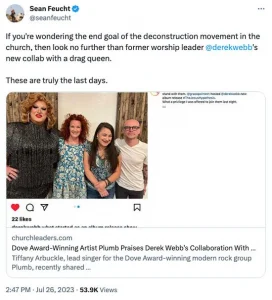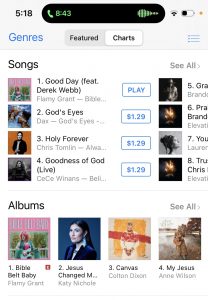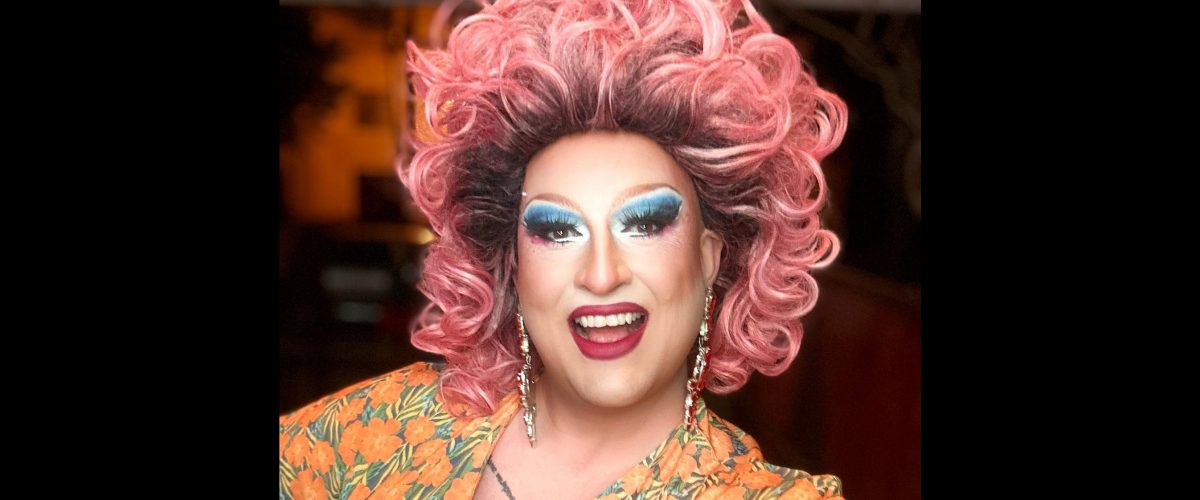Sean Feucht, former worship leader at Bethel Church, founder of the pandemic-era Let Us Worship movement and unsuccessful Republican congressional candidate, didn’t intend to send a drag queen to the top of the Contemporary Christian Music charts.
 But when Feucht tweeted his dismay last week about singer-songwriter Derek Webb’s collaboration with Flamy Grant, the first drag queen to record a full-length Christian album, the backlash sent Flamy Grant’s single “Good Day” (with Webb) and album Bible Belt Baby soaring to the top of the CCM charts.
But when Feucht tweeted his dismay last week about singer-songwriter Derek Webb’s collaboration with Flamy Grant, the first drag queen to record a full-length Christian album, the backlash sent Flamy Grant’s single “Good Day” (with Webb) and album Bible Belt Baby soaring to the top of the CCM charts.
The swift and decisive response to Feucht’s tweet also amplified a conversation long-past its whispered origins: Will CCM ever make space for queer artists?
‘A barrier to entry’
This isn’t the first time an openly queer artist has been in the top spot of the Christian charts. It’s a feat Grace Semler Baldridge, who goes by the stage name Semler, has thrice accomplished, most recently during this year’s Pride Month with the single “Faith.” Despite two previous songs hitting the pinnacle spot in 2021, Semler got the cold shoulder from the Dove Awards last year and ended up attending as a ticketed attendee with a friend.
“Because of who I am, there is a barrier to entry.” Semler said. “It’s a locked door.”
The queer artist thinks something would have to happen within the industry for things to change: “Maybe someone comes out. I think that could happen.”

Derek Webb
“It would almost have to be someone who is already loved and accepted in the space surprising everyone with a coming out moment,” said Derek Webb, who himself enjoyed the industry’s stamp of approval throughout the 1990s and early 2000s as a member of the band Caedmon’s Call. “Someone will be the face to bridge the gap. It feels to me like there’s a lot of people standing around looking at each other waiting to see who will be the first to jump.”
While Semler and Webb agree a big-name artist coming out as gay likely would be a tipping point, Christian music promoter and long-time CCM insider Chris Hauser is skeptical. “I don’t see it happening by 2030, that that someone who is an openly gay or trans artist gets embraced in the Christian music industry,” he said. “There are plenty of people who would like to see it, but some of these things die real, real hard.”
“There are plenty of people who would like to see it, but some of these things die real, real hard.”
Hauser remembers the pushback when Sandi Patti and, later, Amy Grant went through divorces. “Twenty years later, divorce isn’t the big issue,” he said. “But those first people who tested those waters were eaten alive.”
Maybe not so far-fetched
The possibility of a beloved CCM artist coming out as queer is not as farfetched as some may think. “Make no mistake, there have been many gay artists on Christian radio and many gay artists promoted in Christian bookstores,” Webb said. “What they have not been is out.”
According to Webb, the presence of queer Christian artists is something of an open secret. “You could probably knock on any door in Nashville and somebody would know and be able to tell you all about the long tradition of gay singer-songwriters, performers who have been in the space from the beginning and to insiders are well known.”

Chris Hauser
“There are closeted people in our industry,” Hauser agreed. “There are closeted artists and closeted industry people, and they seek me out and come to me like Nicodemus to Jesus in the garden in the middle of the night needing someone to talk to.”
Semler said those who remain silent against the culture of homophobia in Christian music are enablers who send the message “that it’s OK in this industry to hold those beliefs that dehumanize people.”
Two years ago, Semler recorded a song in their living room and after tweeted to someone they see as one of those enablers: Christian music legend Toby McKeehan, who goes by the stage name TobyMac. Semler said McKeehan responded with “something like ‘You are loved,’” a response she describes as an “age-old kind of Christian cop out.”
Fear of retribution
Semler said it is unlikely McKeehan will address the inclusion issue head-on “so long as the market is clear; as long as the gatekeepers of Christian music have decided which audience they want to placate.”
“If people like Toby started speaking out, we might start to see more of that change come more quickly,” Semler said.
Webb believes many industry insiders in Nashville would be supportive “once there wasn’t the fear of retribution; the fear of being outed themselves as an ally,” he said. He also says he has talented queer friends who are trying to break into CCM and “want to see a proudly out artist in CCM, squarely promoted right alongside everybody else. I really feel like it’s time for that.”
The timing of when that might happen comes down to a cringy bottom line, the answer to a question Semler posed in the lyrics to “TobyMac”: “What’s it cost to ignore us?”
We may be on the cusp of finding out. During last week’s Twitter maelstrom, Feucht attempted to categorize Flamy Grant’s music as irrelevant by tweeting: “Hardly anyone listens or cares what you do.”
In response, fans rallied in a concerted effort to boost Flamy Grant’s “Bible Belt Baby,” a 10-month-old album, to the top of the iTunes Christian charts, where it remains as of this writing.
What is ‘Christian’ music anyway?
According to Webb, using the word “Christian” as an adjective to describe music is “a complete fiction of the marketplace. It’s a rubber stamp,” he said. “The word ‘Christian’ applied to anything other than a human being is a marketing term. Let me tell you what there is not, and that is Christian and secular money. It is all the same. And the industry wants it. They are not nonprofits. They are not ministries. They are businesses, and they are based on capitalism.”
Webb thinks we are on the brink of someone taking the plunge.
 “Someone will embrace it,” he said. “There will be a label, a production company, a publishing company progressive enough to want to jump in the history of that moment. And there will be support that will show up. Somebody’s going to be at the front end of the capitalist learning curve.”
“Someone will embrace it,” he said. “There will be a label, a production company, a publishing company progressive enough to want to jump in the history of that moment. And there will be support that will show up. Somebody’s going to be at the front end of the capitalist learning curve.”
If the past several months have been any indication, fans are going to have increasing opportunities to show their support for queer artists as they and their allies band together to make louder and bolder statements.
In addition to the collaboration with Webb on “Good Day,” Bible Belt Baby features Semler and Jennifer Knapp, who came out as a lesbian in 2010.
In April, Webb released his first Christian and Gospel record in 10 years. The album includes a song called “Boys Will Be Girls.” Webb said he wrote the song as a response to a close friend who came out to him.
In June, Webb shot a video for the song with Flamy Grant. The video starts with a quote from Stan Mitchell, a former Nashville pastor and LGBTQ advocate, that reads: “If you claim to be someone’s ally but aren’t being hit by the stones thrown at them, you aren’t standing close enough.” The video depicts Webb’s metamorphous into full drag, in which he finishes the song alongside Flamy Grant.
Feucht’s inflammatory tweet included a photo of Flamy Grant and Derek Webb with Jennifer Knapp and Tiffany Arbuckle, better known by her stage name, Plumb, at a recent Nashville show.
And Flamy Grant’s namesake, Amy Grant, made news earlier this year for hosting a niece’s same-sex wedding at her farm.
At the same time, other CCM artists seem to be doubling down on conservative ideology. John Cooper, of the band Skillet, has been vocal in addressing hot-button issues from a traditional, conservative standpoint across his platforms and in his book Awake and Alive to Truth: Finding Truth in the Chaos of a Relativistic World.
And careful viewers of this summer’s FX documentary The Secrets of Hillsong would have noticed a briefly shown image of Michael Tate of the Newsboys and previously, DC Talk, standing next to Donald Trump.

Semler
A CCM split?
The clashing belief systems represented in these disparate examples may cause one to wonder if CCM, like so many other institutions, is on the verge of a split.
According to Semler, inclusion rather than division is the goal. Neither Semler nor the queer musicians they collaborate with are interested in creating a new CCM industry because they are “hyper aware of the problems within monetizing your expression toward God. … I don’t think we’re looking toward something new as much as sort of forging our own way with a heart for collaboration because we all will need each other. I don’t think there’s going to be an eye for industry as much as there will be for collaboration and freedom of expression.”

Matthew Blake (out of character as Flamy Grant).
Matthew Blake, the singer-songwriter who performs as Flamy Grant, compares the collaborations to “pushing our own elbows out, like we’re creating a little bit more space in that room for someone else to come join us.” The message is “Come alongside me. I’m here with you, especially if you’re already in this space and you’re closeted and afraid.”
Semler looks toward a time “when the barricades we see within old-school CCM just won’t exist (and) the barrier to entry is just not going to be there.” Semler says we already see people supporting “the work for the work’s sake” and is hopeful the traditional barriers “become artificial and crumble on their own.”
Blake contends queer artists belong in Christian music just by virtue of the fact that they exist. “We belong in any space where we are. We belong, just because we are. So if we grew up in an evangelical fundamentalist world, queer people belong there. We might not want to stay there because it’s a hard place. It’s a really hard place to be, but it doesn’t mean we don’t belong.”
Likewise, the music deserves the Christian label because it was created by people who belong in the space, Blake said. “If anybody asks me like, what are the qualifications? How can you call this a Christian record? Part of it is, that’s what’s in me. That’s what I grew up on. It’s what I still love.”
 “It’s not as though I don’t share the same theology of many people who are huge stars in Christian music,” Semler said. “We do share a common faith. I don’t know why I’m the one who got split from participating.”
“It’s not as though I don’t share the same theology of many people who are huge stars in Christian music,” Semler said. “We do share a common faith. I don’t know why I’m the one who got split from participating.”
Although the split isn’t fusing quickly enough for Semler or the other marginalized artists in CCM, change may be coming more quickly than many people think. And it just might be the pushback from conservative factions of Christendom that hasten the day.
It’s been just 26 months since Semler tweeted a song to TobyMac with the lyric: “Well there’s a drag queen out in Tennessee/She dedicates her act to Amy/Oh ‘Baby, Baby’ I hope one day she’ll be acknowledged.”
What once was a wish has been manifested. It’s impossible for anyone looking at the CCM charts not to acknowledge that same drag queen reigning at the top.
Not because someone came out, or a key industry leader softened and offered support. As Flamy Grant herself tweeted: “Never forget this is all thanks to @seanfeucht.”
Cynthia Vacca Davis teaches English at Virginia Wesleyan University. She also is a longtime journalist, writing about community news and faith for several outlets in the Hampton Roads area. She’s the author of Intersexion: A Story of Faith, Identity, and Authenticity from Lake Drive Books. Learn more at cynthiavaccadavis.com or on Instagram @cynthia_vacca_davis.
Related articles:
Queer Christian artist Semler wants to attend the Dove Awards as somebody’s plus-one
How did an openly queer artist climb to No. 1 on the Christian music charts?
Advocacy group names 20 ‘false prophets’ of Christian nationalism


